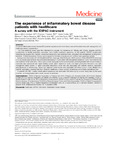Mostrar o rexistro simple do ítem
The experience of inflammatory bowel disease patients with healthcare: a survey with the IEXPAC instrument
| dc.contributor.author | Marín-Jiménez, Ignacio | |
| dc.contributor.author | Casellas, Francesc | |
| dc.contributor.author | Cortés, Xavier | |
| dc.contributor.author | García-Sepulcre, Mariana | |
| dc.contributor.author | Juliá, Berta | |
| dc.contributor.author | Cea-Calvo, Luis | |
| dc.contributor.author | Soto, Nadia | |
| dc.contributor.author | Navarro-Correal, Ester | |
| dc.contributor.author | Saldaña, Roberto | |
| dc.contributor.author | De-Toro, Javier | |
| dc.contributor.author | Galindo, María J. | |
| dc.contributor.author | Orozco-Beltrán, Domingo | |
| dc.date.accessioned | 2019-04-29T11:17:20Z | |
| dc.date.available | 2019-04-29T11:17:20Z | |
| dc.date.issued | 2019-04 | |
| dc.identifier.citation | Marín-Jiménez I, Casellas F, Cortés X, García-Sepulcre MF, Juliá B, Cea-Calvo L, Soto N, Navarro-Correal E, Saldaña R, de Toro J, Galindo MJ, Orozco-Beltrán D. The experience of inflammatory bowel disease patients with healthcare: A survey with the IEXPAC instrument. Medicine (Baltimore). 2019 Apr;98(14):e15044. | es_ES |
| dc.identifier.issn | 0025-7974 | |
| dc.identifier.uri | http://hdl.handle.net/2183/22779 | |
| dc.description.abstract | [Abstract] To assess inflammatory bowel disease (IBD) patients' experience of chronic illness care and the relationship with demographic and healthcare-related characteristics.This cross-sectional survey used the Instrument to Evaluate the EXperience of PAtients with Chronic diseases (IEXPAC) questionnaire to identify parameters associated with a better healthcare experience for IBD patients. IEXPAC questionnaire responses are grouped into 3 factors - productive interactions, new relational model, and patient self-management, scoring from 0 (worst) to 10 (best experience). Scores were analyzed by bivariate comparisons and multiple linear regression models.Surveys were returned by 341 of 575 patients (59.3%, mean age 46.8 (12.9) years, 48.2% women). Mean (SD) IEXPAC score was 5.9 (2.0); scores were higher for the productive interactions (7.7) and patient self-management factors (6.7) and much lower for the new relational model factor (2.2). Follow-up by a nurse, being seen by the same physician, and being treated with a lower number of medicines were associated with higher (better) overall patient experience score, and higher productive interactions and self-management factor scores. A higher productive interactions score was also associated with patients receiving medication subcutaneously or intravenously. Higher new relational model scores were associated with follow-up by a nurse, affiliation to a patients' association, receiving help from others for healthcare, a lower number of medicines and a higher educational level.In patients with IBD, a better overall patient experience was associated with follow-up by a nurse, being seen by the same physician, and being treated with a lower number of medicines. | es_ES |
| dc.language.iso | eng | es_ES |
| dc.publisher | Wolters Kluwer | es_ES |
| dc.relation.uri | https://doi.org/10.1097/MD.0000000000015044 | es_ES |
| dc.rights | Creative Commons Attribution-NonCommercial-NoDerivs 4.0 International License (CC-BY-NC-ND 4.0) | es_ES |
| dc.rights.uri | http://creativecommons.org/licenses/by-nc-nd/4.0/ | * |
| dc.subject | Healthcare | es_ES |
| dc.subject | IEXPAC instrument | es_ES |
| dc.subject | Inflammatory bowel disease | es_ES |
| dc.title | The experience of inflammatory bowel disease patients with healthcare: a survey with the IEXPAC instrument | es_ES |
| dc.type | info:eu-repo/semantics/article | es_ES |
| dc.rights.access | info:eu-repo/semantics/openAccess | es_ES |
| UDC.journalTitle | Medicine | es_ES |
| UDC.volume | 98 | es_ES |
| UDC.issue | 14 | es_ES |
| UDC.startPage | e15044 | es_ES |
Ficheiros no ítem
Este ítem aparece na(s) seguinte(s) colección(s)
-
INIBIC-TCMR - Artigos [102]






